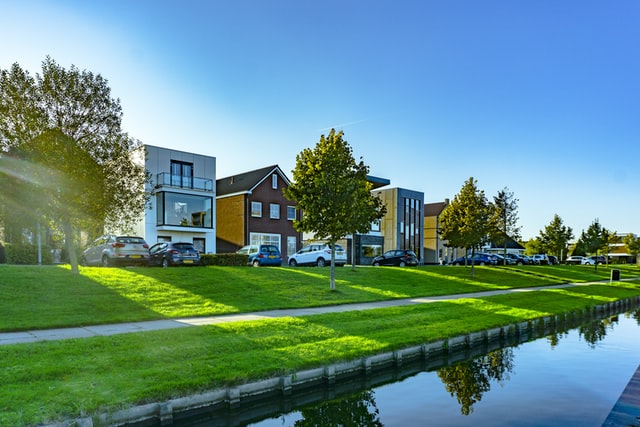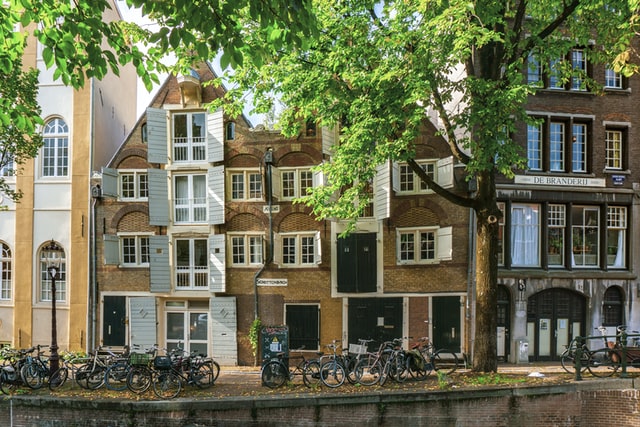Housing in the Netherlands
The Netherlands is one of the most densely populated countries in Europe, with 544 people per square kilometre. The Netherlands has little available space, houses at the lower and middle end of the market tend to be fairly compact out of necessity.

We explore in this section
What are the homes like in the Netherlands?
Most Europeans claim that housing is expensive and the gardens small. Americans used to the spacious properties frequently found in their home country also feel that the rooms themselves are small (particularly children's bedrooms). They are more likely to require the more luxurious end of the market in terms of decoration, fixtures and fittings.
Those coming from places such as Singapore however, where land is also at a premium, may see things differently. Wherever you come from, it is essential to realise that the housing available will probably not be the same as you are used to!
Housing stock in across the Netherlands varies from studio apartments (a single room including sleeping area, living area and cooking facilities) and more traditional apartments with multiple, separate bedrooms, to larger houses (detached, semi-detached, or terraced).
Renting a house
For assignments of less than three years, in the current market, it is usually better to rent. Rental costs are fixed, contracts can be ended if you need to go back home, and the headaches of repairs and maintenance are the property owner's responsibility. Also, there is no loss through having to resell before your costs can be covered, nor the hassle of waiting for the property to sell should the market be slow again read more about renting a house in the Netherlands.

Buying a house
Although it is probably better to rent for a while before buying a house, the difference in monthly payments can make purchasing an attractive option for those staying longer. The difference comes largely from the fact that (for the time being at least) the Dutch government repays some of the mortgage interest as tax relief. Buying a house in the Netherlands. Visit the page dutch mortgage to learn more about mortgages when buying a house.

Why is housing in the Netherlands so expensive?
Housing prices in the Netherlands have surged to some of the highest levels in the European Union. From Q1 2020 to Q1 2021 alone, average home prices rose by more than 12.8%, with even higher increases recorded in the following quarters. This sharp rise is primarily driven by population growth (largely due to immigration), an increasing rate of divorces, and investment by wealthy foreign buyers.
In late December, Dutch politicians finalized a new government agenda that prioritizes addressing the housing crisis. Key measures include accelerating home construction, implementing regulations to limit ownership to two properties per person, and increasing taxes on rental properties.
However, experts believe these steps may not be enough to curb rising prices, which are still expected to increase through 2022 and 2023. While a 5% price drop was recorded in September 2022 — the first decline in years — prices began to climb once again in 2024.
Mortgage rates and house prices
House prices in the Netherlands have experienced significant fluctuations in recent years. After a slight decline of 0.6% in 2023—the first in a decade—the market rebounded strongly in 2024, with prices increasing by approximately 8.5%. This upward trend is expected to continue, with forecasts predicting a further 7% rise in 2025.
Several factors contribute to this sustained growth. Rising wages, declining mortgage rates, and relaxed lending standards have bolstered buyers' confidence and purchasing power. Additionally, the persistent shortage of housing supply continues to drive competition among buyers, leading to increased instances of overbidding. Despite high interest rates, these dynamics have propelled house prices to unprecedented levels, with the average purchase price for existing homes reaching €461,931 in November 2024.
Mortgage interest rates have also undergone notable changes. After peaking at 4.13% at the end of 2023, rates began to decline in 2024. For instance, the 10-year fixed mortgage rate decreased from approximately 3.78% in January 2024 to 3.23% by January 2025. Similarly, the 20-year fixed rate dropped from 4.24% to 4.08% over the same period. This decline in mortgage rates has improved affordability for many buyers, further stimulating the housing market.
However, recent developments indicate a reversal in this trend. As of March 2025, fixed mortgage rates have experienced their largest weekly increase in 2.5 years, with the 20-year fixed rate rising by over 0.15 percentage points to 4.07%. Overall the Dutch housing market is very strong.
Do i need home insurance?
Home insurance is not legally required in the Netherlands, but it is highly recommended for homeowners and renters alike. There are two main types of home insurance to consider:
Homeowners insurance (Opstalverzekering)
This insurance covers damage to the structure of your home. If you have a mortgage, your lender will usually require you to have this type of insurance. It covers events like fire, storms, and vandalism.
Contents insurance (Inboedelverzekering)
This insurance covers your personal belongings within your home. It protects against theft, fire, water damage, and other risks. While not mandatory, it is advisable to protect your possessions.
Read more in our Home insurance section.
